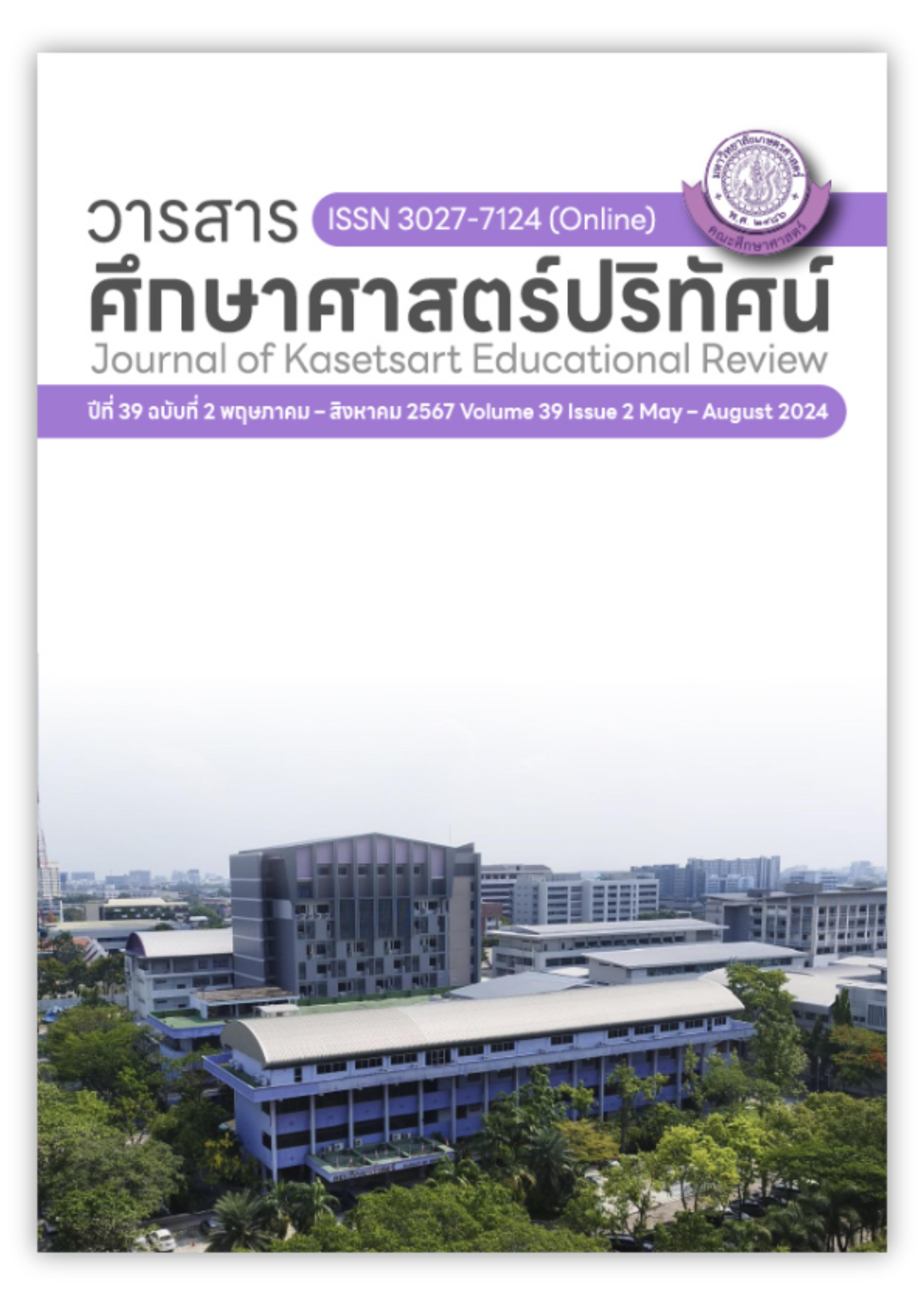การพัฒนาความเข้าใจธรรมชาติวิทยาศาสตร์ของนักเรียนชั้นประถมศึกษาปีที่ 6 ผ่านการจัดการเรียนรู้แบบสืบเสาะโดยใช้ประเด็นทางสังคม ที่เกี่ยวเนื่องกับวิทยาศาสตร์เป็นฐาน
คำสำคัญ:
การจัดการเรียนรู้โดยใช้ประเด็นทางสังคมที่เกี่ยวเนื่องกับวิทยาศาสตร์เป็นฐาน, ธรรมชาติของวิทยาศาสตร์, ความเข้าใจธรรมชาติของวิทยาศาสตร์บทคัดย่อ
งานวิจัยนี้มีวัตถุประสงค์เพื่อพัฒนาความเข้าใจธรรมชาติของวิทยาศาสตร์ของนักเรียนระดับชั้นประถมศึกษาปีที่ 6 ผ่านการจัดการเรียนรู้แบบสืบเสาะโดยใช้ประเด็นทางสังคมที่เกี่ยวเนื่องกับวิทยาศาสตร์เป็นฐาน โดยมีกลุ่มเป้าหมายของการวิจัย คือ นักเรียนชั้นประถมศึกษาปีที่ 6 จำนวน 22 คน วิจัยนี้ใช้รูปแบบการวิจัยแบบการวิจัยปฏิบัติการในชั้นเรียน เครื่องมือที่ใช้ในการวิจัย ได้แก่ แผนการจัดการเรียนรู้แบบสืบเสาะโดยใช้ประเด็นทางสังคมที่เกี่ยวเนื่องกับวิทยาศาสตร์เป็นฐาน เรื่อง ปรากฏการณ์ธรรมชาติและธรณีพิบัติภัย ระดับชั้นประถมศึกษาปีที่ 6 ใบกิจกรรมการเรียนรู้ และแบบประเมินความเข้าใจธรรมชาติวิทยาศาสตร์ของนักเรียนชั้นประถมศึกษาปีที่ 6 วิเคราะห์ข้อมูลเชิงเนื้อหาและสถิติเชิงพรรณนา ผลการวิจัยพบว่า ความเข้าใจธรรมชาติวิทยาศาสตร์ของนักเรียนชั้นประถมศึกษาปีที่ 6 หลังการจัดการเรียนรู้แบบสืบเสาะหาความรู้โดยใช้ประเด็นทางสังคมที่เกี่ยวเนื่องกับวิทยาศาสตร์เป็นฐานสูงกว่าก่อนเรียน การจัดการเรียนรู้แบบสืบเสาะโดยใช้ประเด็นทางสังคมที่เกี่ยวเนื่องกับวิทยาศาสตร์เป็นฐานสามารถพัฒนาความเข้าใจธรรมชาติวิทยาศาสตร์ของนักเรียนชั้นประถมศึกษาปีที่ 6 โดยเฉพาะด้านการสังเกตและการลงความเห็นมีความแตกต่างกัน การใช้จินตนาการและความคิดสร้างสรรค์ในการแสวงหาความรู้ด้านวิทยาศาสตร์ และเทคโนโลยีกับวิทยาศาสตร์มีความแตกต่างกันแต่มีความสัมพันธ์กัน
เอกสารอ้างอิง
American Association for the Advancement of Science (AAAS). (2009). Project 2061: American Association for the Advancement of Science. (n.d.). Www.aaas.org. http://www.project2061.org/
Ariza, M. R., Christodoulou, A., van Harskamp, M., Knippels, M. C. P. J., Kyza, E. A., Levinson, R., and Agesilaou, A. (2021). Socio-Scientific Inquiry-Based Learning as a Means toward Environmental Citizenship. Sustainability, 13(20), 11509. https://www.mdpi.com/2071-1050/13/20/11509
Chimpalee, K. (2016). Understanding the Nature of Science among Fifth-Year High School Students. Journal of Research in Science, Technology, and Environmental Education, 8(1), 85. [in Thai]
Jongkrajak, P. (2020). Nature and Inquiry in Science. Faculty of Education, Rajabhat University Phuket. [in Thai]
Kijgeukul, S. (2013). Nature of Science and Learning Indicators. Journal of Education and Innovation, 14(3), 119–124. https://so06.tci- thaijo.org/index.php/ edujournal_nu/article/view/9359. [in Thai]
Kijgeukul, S. (2013). Nature of Science and Learning Indicators (Part 2). Journal of Education and Innovation, 15(2), 137–142. https://so06.tci- thaijo.org/index.php/ edujournal_nu/article/view/9236. [in Thai]
Ladachart, L., Sutthakul, L., & Fahkamta, C. (2013). Significant Differences in Promoting the Teaching of "Nature of Science" Externally and Internally. Agricultural Journal (Social), 34, 269-282. [in Thai]
Lederman, N. G., Abd-El-Khalick, F., Bell, R.L., & Schwartz, R. S. (2002). View of nature of science questionnaire: toward valid and meaningful assessment of learner’s conceptions of nature of science. Journal of Research in Science & Teaching, 39(6), 497-521.
Levinson, R. (2018). Introducing socio-scientific inquiry-based learning (SSIBL). School Science Review, 100(371), 31-35.
Neungchaleem, P. (2013). Teaching the Nature of Science. Science Education Journal, 7(1), 131-135. [in Thai]
Office of the Basic Education Commission, Ministry of Education. (2017). Indicators and Core Content of the Science Learning Area (Revised Edition, 2017) According to the Basic Education Core Curriculum, Buddhist Era 2551. Cooperative Agricultural Association of Thailand Limited: Bangkok. [in Thai]
Ratchaniphon, A. (2021). The Effects of Socially Relevant Science Learning on the Transmission of Genetic Traits towards Science Learning Achievement and Scientific Reasoning Ability of Grade 9 Students at Koh Siray School, Phuket Province. Journal of Science Education, Thaksin University, 21(2), 110. [in Thai]
Rauch, F. & Radmann, D. (2020). How Socio-Scientific Inquiry Based Learning (SSIBL) promotes inquiry in climate issues – An example for enacting socio-scientific issues in science education. Action Research and Innovation in Science Education, 3(2), 43-45.
Sombatthasi, R. (2023). Inquiry-Based Learning Using Socially Relevant Science Topics: The Case of Acids and Bases and Its Impact on Assessment Performance and Scientific Inquiry Skills of Fifth-Year High School Students. Journal of Inclusive and Innovative Education, 7(2), 31. [in Thai]
Theingchantharatiphon, K. (2021). Understanding the Nature of Science among Student Teachers of Science Internship. Yala Rajabhat University Journal, 16(2), 276-286. [in Thai]
ดาวน์โหลด
เผยแพร่แล้ว
ฉบับ
ประเภทบทความ
สัญญาอนุญาต
ลิขสิทธิ์ (c) 2024 วารสารศึกษาศาสตร์ปริทัศน์

อนุญาตภายใต้เงื่อนไข Creative Commons Attribution-NonCommercial-NoDerivatives 4.0 International License.
บทความทุกบทความเป็นลิขสิทธิ์ของวารสารคณะศึกษาศาสตร์ มหาวิทยาลัยเกษตรศาสตร์ วิทยาเขตบางเขน
วารสารศึกษาศาสตร์ปริทัศน์ (Kasetsart Educational Review)






